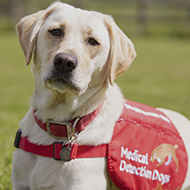
The charity trains dogs to detect odours of human diseases.
The RCVS has announced the recipient of this years' Christmas donation as Medical Detection Dogs (MDD).
Chosen by RCVS president Dr Kate Richards, Medical Detection Dogs trains canines to detect the odours of human diseases at early stages.
Previous recipients of the annual donation include StreetVet, The American Fondouk, Iris's Cats in Need and The Country Trust.
Kate discussed her choice: “Medical Detection Dogs is One Health in action, demonstrating the connection and inter-dependency between people and animals.
“The charity trains dogs to detect the odour of human diseases and is now trialling dogs in real-life settings to detect the odour of Covid-19. Their results indicate that dogs perform better than the lateral flow test.
“The study, still to be peer reviewed, indicates that using dogs will be considerably faster than existing testing methods since one dog can screen up to 250 people in an hour. Despite the advances in technology, these dogs are at the sniffing edge of science.”
Claire Guest, MDD CEO, commented on the donation: “We are very grateful for this generous donation from the RCVS which will help us continue our mission to train dogs to save lives using their amazing sense of smell.
“We share a joint appreciation and understanding of just how incredible our wet-nosed companions are and the work of MDD shows that the future of disease diagnosis could be held in their paws.
“Our dogs have already successfully proven that they are superior to any technology when detecting the odour of diseases like cancer, Parkinson’s and malaria and conditions like Type 1 diabetes and postural tachycardia syndrome.
“Now, at a time when the pandemic is affecting us all either directly or indirectly, they are also on the cusp of being an extra, fast, accurate layer of defence to help keep us safe and keep the world moving.”
Image (C) Neil Pollock, Medical Detection Dogs



 The RCVS has announced a new version of its 1CPD mobile app, with enhanced features for veterinary surgeons and veterinary nurses to record their continuing professional development.
The RCVS has announced a new version of its 1CPD mobile app, with enhanced features for veterinary surgeons and veterinary nurses to record their continuing professional development.